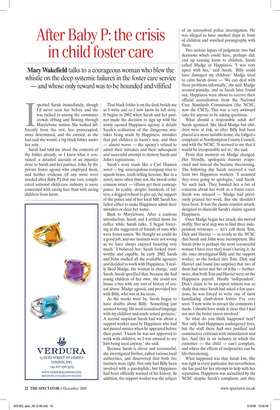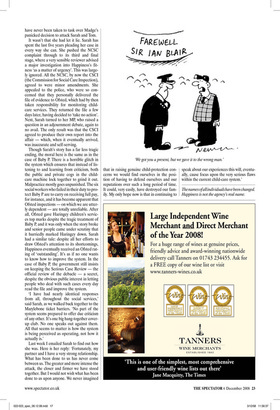After Baby P: the crisis in child foster care
Mary Wakefield talks to a courageous woman who blew the whistle on the deep systemic failures in the foster care service — and whose only reward was to be hounded and vilified Ispotted Sarah immediately, though I’d never seen her before and she was tucked in among the commuter crowds ebbing and flowing through Marylebone station. She walked differently from the rest, less preoccupied, more determined, and she carried, as she had said she would, a big black folder under her arm.
Sarah had told me about the contents of the folder already, so I knew what it contained: a detailed account of an injustice done to Sarah and her partner, John, by the private foster agency who employed them, and further evidence (if any more were needed after Baby P) that our vast, complicated national child-care industry is more concerned with saving face than with saving children from harm. That black folder is on the desk beside me as I write and so I now know its full story. It begins in 2002 when Sarah and her partner made the decision to sign up with the newly opened Happiness agency; it details Sarah’s realisation of the dangerous mistakes being made by Happiness, mistakes that put children in harm’s way, and then — almost worse — the agency’s refusal to admit their mistakes and their subsequent and successful attempt to destroy Sarah and John’s reputations.
Sarah’s story reads like a Carl Hiaasen novel — big, unscrupulous company tries to squash brave, truth-telling heroine. But in a novel, more often than not, the moral order remains intact — villains get their comeuppance. In reality, despite hundreds of letters, a dogged refusal to give up, the support of the police and of her local MP, Sarah has failed either to make Happiness admit their mistakes or clear her name.
Back to Marylebone. After a cautious introduction, Sarah and I settled down for coffee while Sarah talks. ‘I began fostering at the suggestion of friends of ours who were foster carers. We thought we could do a good job, and our instincts were not wrong as we have always enjoyed fostering very much.’ I believed her: Sarah looked trustworthy and capable. In early 2002 Sarah and John studied all the available agencies and decided to work with Happiness. ‘I really liked Madge, the woman in charge,’ said Sarah. Sarah specified that, because she had young children of her own, she could not house a boy with any sort of history of sexual abuse. Madge agreed, and provided her with Billy, who was in his teens.
As the weeks went by, Sarah began to have doubts about Billy. ‘Something just seemed wrong. He used sexualised language with my children and made sexual gestures.’ A second suspicion Sarah had was about a support worker used by Happiness who had not passed muster when he appeared before their panel. ‘I knew he was not approved to work with children, so I was amazed to see him being used anyway,’ she said.
Because Sarah is clever and resourceful, she investigated further, called various local authorities, and discovered that both her instincts were right. Not only had Billy been involved with a paedophile, but Happiness had been officially warned of his history. In addition, the support worker was the subject of an unresolved police investigation. He was alleged to have smoked dope in front of children and watched pornography with them.
Two serious lapses of judgment; two bad decisions which could have, perhaps did, end up causing harm to children. Sarah called Madge at Happiness, ‘I was very upset with her,’ said Sarah. ‘Billy could have damaged my children.’ Madge tried to calm Sarah down — ‘We can deal with these problems informally,’ she said. Madge seemed panicky, and as Sarah later found out, Happiness were about to receive their official accreditation from the National Care Standards Commission (the NCSC, now the CSCI). This was a very awkward time for anyone to be asking questions.
What should a responsible adult do? Sarah agonised. She liked Madge but children were at risk, so after Billy had been placed in a more suitable home, she lodged a complaint at Northampton County Council, and with the NCSC. ‘It seemed to me that it would be irresponsible not to,’ she said.
From that moment on Madge changed. Her friendly, apologetic manner evaporated and instead she became threatening. The following day Sarah received a visit from two Happiness workers. ‘I assumed they were going to apologise,’ said Sarah. No such luck. They handed her a list of concerns about her work as a foster carer. Sarah was amazed — Madge had previously praised her work. But she shouldn’t have been. It was the classic counter-attack, designed to discredit Sarah’s claims against Happiness.
Once Madge began her attack, she moved swiftly. Her next step was to find three independent witnesses — let’s call them Tom, Dick and Harriet — to testify to the NCSC that Sarah and John were incompetent. But Sarah (who is perhaps the most resourceful woman I have ever met) wasn’t having it. As she once investigated Billy and the support worker, so she looked into Tom, Dick and Harriet and found (no surprise) that two of them had never met her or John — furthermore, that both Tom and Harriet were on the Happiness payroll. Hardly ‘independent’. Dick’s claim to be an expert witness was so shaky that once Sarah had asked a few questions, he was forced to write one of most humiliating climb-down letters I’ve ever seen: ‘I now write to retract the comments I made. I should have made it clear that I had not met the foster carers involved.’ So what do you think happened next? Not only had Happiness endangered lives, but the staff there had met justified and constructive criticism with intimidation and lies. And this in an industry in which the customer — the child — can’t complain, and where the effects of malpractice can be life-threatening.
What happened was that Sarah lost. She was right in every particular, but nevertheless she has paid for her attempt to help with her reputation. Happiness was accredited by the NCSC despite Sarah’s complaint, and they have never been taken to task over Madge’s panicked decision to attack Sarah and Tom.
It wasn’t that she had let it lie. Sarah has spent the last five years pleading her case in every way she can. She pushed the NCSC complaint through to its third and final stage, where a very sensible reviewer advised a major investigation into Happiness’s fitness ‘as a matter of urgency’. This was largely ignored. All the NCSC, by now the CSCI (the Commission for Social Care Inspection), agreed to were minor amendments. She appealed to the police, who were so concerned that they personally delivered the file of evidence to Ofsted, which had by then taken responsibility for monitoring childcare services. They returned the file a few days later, having decided to ‘take no action’. Next, Sarah turned to her MP, who raised a question in an adjournment debate, again to no avail. The only result was that the CSCI agreed to produce their own report into the affair — which, when it eventually arrived, was inaccurate and self-serving.
Though Sarah’s story has a far less tragic ending, the moral here is the same as in the case of Baby P. There is a horrible glitch in the system which ensures that instead of listening to and learning from criticism, both the public and private cogs in the childcare machine lock together to grind it out.
A
Malpractice mostly goes unpunished. The six social workers who failed in their duty to protect Baby P are to carry on receiving full pay, for instance, and it has become apparent that Ofsted inspections — on which we are utterly dependent — are totally unreliable. After all, Ofsted gave Haringey children’s services top marks despite the tragic treatment of Baby P, and it was only when the story broke and senior people came under scrutiny that it hurriedly marked Haringey down. Sarah had a similar tale: despite all her efforts to draw Ofsted’s attention to its shortcomings, Happiness eventually received an Ofsted rating of ‘outstanding’. It’s as if no one wants to know how to improve the system. In the case of Baby P, the government still insists on keeping the Serious Case Review — the official review of the debacle — a secret, despite the obvious public interest in letting people who deal with such cases every day read the file and improve the system.
‘I have had nearly identical responses from all, throughout the social services,’ said Sarah, as we walked back together to the Marylebone ticket barriers. ‘No part of the system seems prepared to offer due criticism of any other. It’s one big hang-together coverup club. No one speaks out against them. All that seems to matter is how the system is being perceived as operating, not how it actually is.’ Last week I emailed Sarah to find out how she was. Here is her reply: ‘Fortunately, my partner and I have a very strong relationship. What has been done to us has never come between us. The greater and more intense the attack, the closer and firmer we have stood together. But I would not wish what has been done to us upon anyone. We never imagined that in raising genuine child-protection concerns we would find ourselves in the position of having to defend ourselves and our
N 008SCATO A 3/09/00
reputations over such a long period of time. It could, very easily, have destroyed our family. My only hope now is that in continuing to speak about our experiences this will, eventually, cause focus upon the very serious flaws within the current child-care system.’
:17 Pag
The names of all individuals have been changed. Happiness is not the agency’s real name.



















































































 Previous page
Previous page